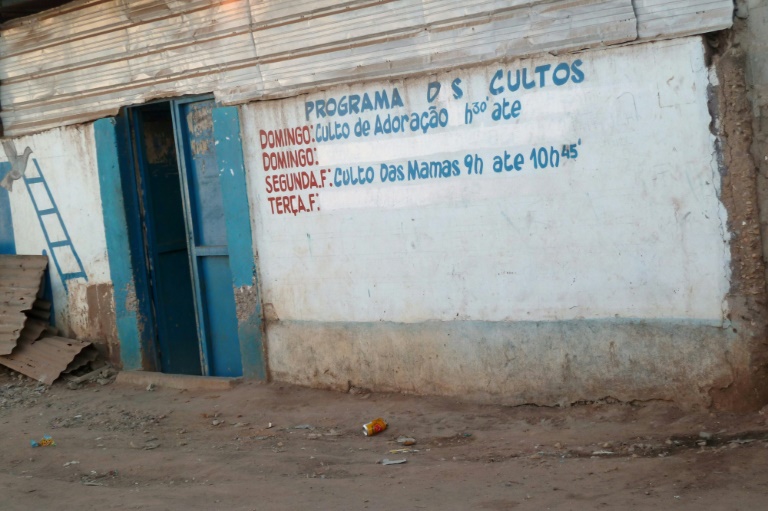
In Angola empty and underused properties are rented out to fulfil the booming demand from evangelical churches © AFP / Daniel FREDERICO
Luanda, Angola, Jan 13 – Pastor Gabriel Baptiste of the Pentecostal “Bread of Life” church in the Angolan capital Luanda preaches in a premises that used to be a busy barber’s shop.
The change of function is one example how the country’s reversal in economic fortunes has seen empty and underused properties rented out to fulfil the booming demand from evangelical churches.
“The refusal of the state to allocate space for us generates all kinds of situations like this one,” Baptiste told AFP.
“But we will continue — the important thing is the word of God, even if preached in a store.”
Baptiste preaches to about 70 people, four times a week, in a large shop space that was previously where Joaquin Barbosa cut hair in the Hoji-ya-Henda district in the north of Luanda.
“It is not easy nowadays,” said Barbosa. “The peculiar thing is that recently many shops have been turned into churches. Where does Angola go from here?”
After the end of its bloody 27-year civil war in 2002, Angola enjoyed an explosion of investment and construction as the country emerged as one of Africa’s leading oil producers.
But the collapse of oil prices in 2014 tipped the country into a major crisis, with a plunging currency, shortages of basic consumer goods such as sugar, and inflation soaring to near 40 percent.
“We have no money to build churches, so we take advantage of empty spaces,” Congolese Pentecostal pastor Jeremias Roger told AFP.
“The country is going through difficult times because of the crisis, but this cannot affect our spirit.”
Roger said he was delighted to be able to hold services for about 120 people in an underused warehouse in Luanda’s western district of Palanca, surrounded by sacks of rice and oil cans.
– Bars, discos and barbers –
Angola’s annual economic growth soared to over 20 percent in 2007, drawing in immigrants from Mali, Senegal, Nigeria, Guinea and across Africa, many of whom set up as small shopkeepers.
But growth has collapsed to less than two percent and imported goods have rocketed in cost.
“We have reached such a point that we can no longer buy abroad. We are going to be out of stock soon,” said Abu Mutari Sayidy, a food importer from Ivory Coast.
Like many other businesses, struggling bars and discos have also been adapted for part-time users.
The Christian Church of Salvation holds services for more then 100 people each week on Sunday and Monday at the Salao de Festas Zita bar-disco.
“Our mission is to spread the word of God, whatever the place,” the church’s self-proclaimed prophet Manuel Jeovani told AFP.
“And if, at the same time, we can give some type of remuneration to the owner of the place, then so much the better.”
The arrival of many small, often personality-based, churches has worried Angolan authorities, which try to discourage them by only recognising churches that have 10,000 registered members.
As across much of Africa, many church leaders tap into widespread desperation and poverty, offering miracle cures and enrichment to followers who are vulnerable to exploitation.
Despite the government’s efforts, more than 1,000 clandestine churches are estimated to evade the authorities by operating discreetly at temporary sites that change frequently.
President Jose Eduardo dos Santos, who has ruled since 1979, has acknowledged the country is suffering economically — and some ruling MPLA party officials say he will finally step down before elections due this year.
It could mean a new chapter for Angola.
For many in Luanda, the closed shops and noisy new churches represent Angola’s myriad troubles that its leaders must confront.
“The churches make so much noise we can’t sleep in peace,” said Ana Marta, 52, who lives in the Palanca district. “They bother us with music until 05:00 am.”









































